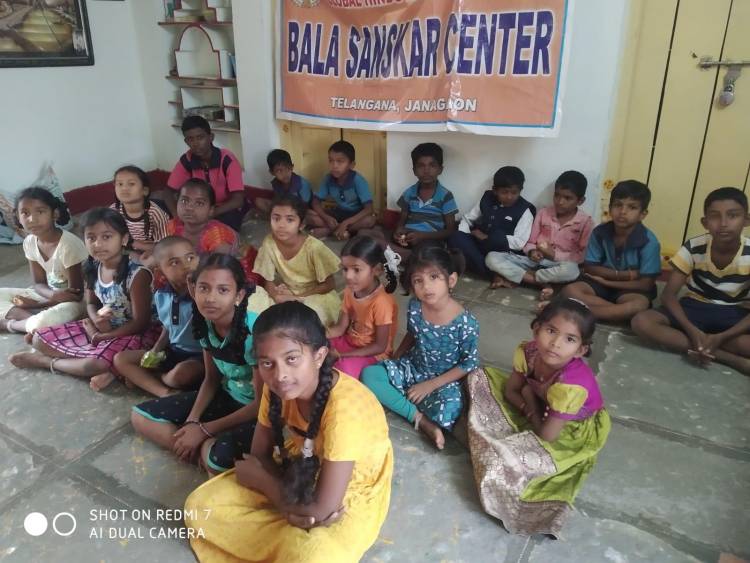[GHHF] Bala Samskar Kendras – Students are taught about the importance of Bhagavad Gita and learned Gita Gyana Sloak 4.
 Global Hindu Heritage Foundation is committed to transmit the richness of Sanatana dharma to the youngsters in terms of the depth and width of knowledge, the sacrifices of national heroes, miracles of Maha Rishis, science and mathematics, and the importance of maintaining the traditions and customs. We take pride in teaching various Sloks, and Stotras to the students. We also teach about several moral stories culled from Panchatantras and other Jataka stories to create dharmic values and develop a set of moral values that will guide them for the rest of their lives.
Global Hindu Heritage Foundation is committed to transmit the richness of Sanatana dharma to the youngsters in terms of the depth and width of knowledge, the sacrifices of national heroes, miracles of Maha Rishis, science and mathematics, and the importance of maintaining the traditions and customs. We take pride in teaching various Sloks, and Stotras to the students. We also teach about several moral stories culled from Panchatantras and other Jataka stories to create dharmic values and develop a set of moral values that will guide them for the rest of their lives.
The Dhyana Shlokas are prayer verses and must necessarily be recited each time before starting the study of Bhagavad Gita, just as we have a particular Shanti Mantra to be recited before each Upanisad study session. These 9 Shlokas are not from the Bhagavad Gita but were added much later by a learned person Madhusudan Sarasvati when he wrote the commentary on the Gita, a monumental work called Gudhartha Dipika literally meaning Illuminating the deep purport of the verses of the Bhagavad Gita. Subsequently there have been many commentaries on this very commentary, the most popular one being by Swami Gambhirananda. Just shows that an intense study is required. In other words, we all need to be alert and fit, both mentally as well as physically, to receive this sublime knowledge and so a humble prayer is required before commencing study. It’s a sort of invocation to the Lord to help us in every way to successfully complete the study of the entire Gita, comprising more than 700 verses. Typically, a regular weekly Bhagavad Gita study class can go on for about 3+ years and so we need the inner strength on our spiritual path. These 9 beautiful melodious verses provide just the right setting and inspiration, as we will see as we study them one by one. (Website: Vedanta Vision)
Gita Dhyana Sloka – 4
sarvopanishado gavo dogdha gopalanandana:
parthovatsa: sudheerbhoktha dugdham gitamrutam mahat
sloka meaning:
(If)All Upanishads are (likened to) cows. The milker is the son of the cowherd, Krishna; Arjuna, son of prutha, is the calf; the men of purified intellect are the drinkers, and the milk is the supreme
nectar of Gita.
Vedas are the breath of the Lord. Upanishads are the defining points of the Vedas. Sort of crowns. All Upanishads are compared to cows here. If the milk is compared to Gita, then it means that the knowledge attained through a devoted study of the Gita gives the essence of all Vedas (and Upanishads in turn). In many slokas Upanishadic verses are repeated verbatim in the Gita. Foreseeing the difficulty of the forthcoming generations of Kaliyuga vasis, Krishna has prepared a digest of the consummate wisdom of the Vedas and presented them in his dialogue with Arjuna. Let us memorize this sloka today. I believe you have memorized the previous three.
This sloka is explained by Smt. Jaya Row as follows:
The example of milk is used because it is a universal food enjoyed by everyone from newborns to old people, invalids to athletes and people from all over the world. Similarly, the Bhagavad Gita is a universal food for the soul which nourishes and empowers everyone, from an ordinary person to a sage on the verge of Realization.
Cows take in dry grass and water and give wholesome, nourishing milk to us. Similarly, the Upanishad sages drew wisdom from ordinary, everyday experiences of life. They found, as Shakespeare put it in his play ‘As You Like It’, “…tongues in trees, books in running brooks, sermons in stones, And good in everything.” They had the vision to see the Divinity in and through their worldly experiences.
We do not have the vision to glean the wisdom from normal experiences of life, just as we cannot convert hay and water to milk! We need to go through the process of learning the knowledge from the sages who mastered it, assimilated it and lived it. We need pre-digested food as we lack the ability to learn directly from life.
Krsna was the expert milker. Milking a cow is an art. Else the cow kicks an uninitiated person. Krsna knew the art of culling the wisdom of the Upanishads and presenting it in a form that the common person could easily relate to and apply in life. He gives us pre-digested spiritual food because we do not have the ability to directly learn the subtle, concise, cryptic knowledge of the Upanishads. If the knowledge is not interpreted properly, it only serves to confuse the person further. Just as an average person cannot understand pure science. It has to be diluted and explained for an ordinary person to appreciate it.
Partha was the calf. A cow gives milk only when the calf is present. Similarly, a teacher gives out his knowledge only when a sincere student is before him. However, the calf does not get the real nutrition from the milk. Similarly, though the message of the Gita was given out to Arjuna, he was not able to benefit from it as much as true seekers of the Self. The people who benefit most from the Bhagavad Gita are those who have the real thirst to get out of this limited, constricted existence that we have reduced ourselves to. Admittedly, such seekers are few and far between. Most of us just want peace from the stresses and strains of life. But irrespective of where we are on the spiritual path, the Gita serves as an infallible guide.
The example of the cow is used because it has a special significance to Indians. It seems to live on the principle of maximum work, minimum profit. It lives a life of service and sacrifice without any demands, it gives of itself completely without expecting anything in return. And the funny thing is, the less we demand, the more we profit.
The supreme nectar of the Gita is milk. The result of the study of the Gita is supreme bliss. Studying itself is fulfilling. When we apply the principles and reap the benefit it is exhilarating. Every step of the way is enchanting. One leads a nectarine life, able to overcome challenges and emerge victorious. (Source: Vedantathoughts)
Your donations are appreciated;
By Zelle: ghhfusaorg@gmail.com
PayPal: savetemples.org
By Check: Or you can send a check payable to GHHF, 14726 Harmony Lane, Frisco, TX 75035.
It is tax-deductible.
By Rupees: call 601-918-7111; +91 83096 43979.





















 Urgent support needed for Bangladesh Hindus
Urgent support needed for Bangladesh Hindus 







